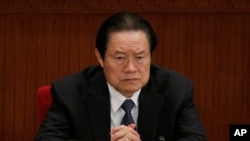Chinese authorities have formally indicted former security chief Zhou Yongkang, once one of China's most powerful political figures. Zhou is the highest-ranking politician in China to face charges in more than three decades and the biggest catch to date in Chinese President Xi Jinping’s expansive anti-corruption drive.
A brief statement on the indictment, posted Friday on the website of China’s top prosecutors office, said Zhou’s crimes of bribery, abuse of power and leaking state secrets stretched from his time as head of China National Petroleum Corporation - one of the world’s biggest energy companies - to his final post as a member of China’s powerful Politburo Standing Committee.
The statement said Zhou’s alleged crimes were extremely serious and that his “abuse of power has led to great losses of public funds.” Without elaborating, it added that his crimes severely damaged national and public interests and had an adverse social impact.
A court in the northeastern city of Tianjin, not far from the Chinese capital of Beijing, will handle Zhou’s case. It is not clear when the trial will begin or how open to the public it may be, given the state secrets charge and the sensitivity of the case.
China’s ruling Communist Party has been investigating Zhou since late 2013, and a massive case against him has been building in Chinese media. Reports have emerged about what is said to have been an expansive network either directly or indirectly suggesting his involvement. The network apparently had its tentacles in everything from energy to security, the court systems and organized crime.
China Corruption - Zhou Yongkang
Zhou Yongkang
- Dec. 1942: Born in Wu Xi city Jiangsu Province
- Nov. 1964: Became a member of the Communist party
- March 1998: Became party secretary of China National Petroleum Corporation
- 1999: Appointed Sichuan's party secretary
- 2002: Appointed member of the Politburo at the 16th Party Congress and became minister of public security
- 2007: Joined the Standing Committee of the Politburo
- 2012: Political ally Bo Xilai was removed from office; other political allies were investigated and/or fired
- No. 2012: Retired
- Dec. 2013: His son Zhou Bin was arrested on charges of corruption
- Dec. 2014: Arrested and the Communist party expelled him
In the indictment and charges outlined in the statement online, little was said about Zhou’s intimate friends and relatives, notes veteran China watcher Willy Lam.
“The only surprise perhaps is that they have made no reference to his son or his other relatives, as well as his cronies and former colleagues, numbering in perhaps more than 100 people, who were also members of the corruption gang led by Zhou Yongkang,” said Lam.
Beijing-based political commentator and historian Zhang Lifan said the charges appear to have shrunk and there is no mention about whether Zhou was involved in an internal political struggle together with ousted politician Bo Xilai. Bo was sentenced to life in prison on corruption and abuse of power charges before the investigation into Zhou began and Bo was seen as political rival to Xi Jinping.
Zhang said “the coup that Zhou was widely rumored to have taken part in appears to have been left out [of the indictment]… The most serious crime he has been charged with, the leaking of state secrets, seems to refer to the possibility that he leaked information to Bo Xilai,” he added.
Zhou was once head of China’s state security and in charge of its domestic spy agencies, a position that allowed him access to information on other high-ranking politicians.
The state secrets charge is likely to have an impact on the transparency of the trial and could mean the proceedings may be only partially open to the public, if at all. The charges may also help to keep dirty details related to the party’s political infighting far from the public’s view.
Zhou is the highest-ranking party member to face charges since the aftermath of the Cultural Revolution when Mao Zedong’s wife and the “Gang of Four” faced treason charges in 1981 for persecuting their political opponents.
On social media in China, many have referred to Zhou and other officials already caught up in the anti-corruption drive as the new “Gang of Four.” Online, the speculation is that Zhou, Bo and others were plotting or somehow taking steps to prevent Xi Jinping from rising to power.
While the trial could shed light on those details, Lam said it is most likely that we may never know for sure what the charge of leaking state secrets is about.
“However, according to various people in Beijing, it could be one of two things: it could be either the tapped telephone conversations of top leaders such as Xi Jinping or Hu Jintao, or information regarding the business activities of the relatives of a couple of senior politburo members,” said Lam.
Analysts say that given the crimes Zhou has been accused of and the fact that they stretch back more than two decades, it is likely he could get the death penalty. They say if he has cooperated with authorities, he could be given a death sentence with two years’ reprieve, which basically amounts to life in prison.














